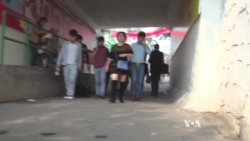In China’s southern city Guangzhou it is clear that although Ebola has not reached this country’s shores, the threat of the disease is already having an impact.
The city with the largest community of Africans in Asia is undergoing an intensified crackdown against unregistered businesses and visa overstays, adding to an atmosphere of suspicion for foreigners.
Large red banners along roads in Xiaobei, one of several key trading hubs for Africans in Guangzhou, announce the police campaign and warn about the epidemic in Africa with slogans such as, “Ebola, There’s no Vaccine.”
Ebola fears
Streets that used to be busy with vendors barbecuing meat or selling trinkets to Africans to take home are now empty.
Shop owners say business has taken a serious hit.
“Of course we worry, but that’s all it is, is a worry, there is not much one can do. We still have to make a living for my family,” says one Chinese owner of a clothing shop.
African traders are also feeling the economic pinch. Some like Lamin Ann are not sure how much longer their business can stay afloat at a time when he says they are treated like pariahs.
“If they see that you are black and that you are from Africa, then they will obviously start running away from you. Business is not ok right now,” he says.
Among West African nations, the Ebola outbreak has throttled cross-border trade and emptied local markets, as fears over contagion keep people away.
That has hurt traders in China who were buying all kinds of goods to send to businesses back home, says Barry Sultane, a local leader for the Guinea community in Guangzhou.
“It is affecting the business here, because a lot of people are depending on business they do there,” he said.
Precautions and businesses
China has not reported a single case of Ebola, but members of the African expat community here still take precautions, limiting physical contact such as hugging and shaking hands with individuals who have recently returned from Ebola-hit countries.
African trader Brigitta says the epidemic looms over their interactions with others.
“I am a little bit scared because I am meeting different kinds of people. So I may not know who is who. And who is well and if someone is not ok,” she said.
But for most, business must go on. At the landmark Tianxiu Mansions, a tall building full of trading shops that sell everything from hair extensions to electronics, fabric traders are unloading piles of colorful traditional African fabric.
One seller at the store says that although business has slowed they are confident long-term customers will keep placing orders, albeit online.
“Ebola is definitely having an impact, many of our customers are no longer coming here to buy,” she says. “But that’s not the only reason.”
Crackdown
The other reason is that authorities are cracking down on Guangzhou’s thousands of visa over-stayers. Authorities in the southern port frequently search for foreigners guilty of committing what are called the “san fei” or the “three illegals:” those who enter, stay and work here illegally.
But going after visa violators at a time when authorities are also trying to prevent the spread of Ebola does not help build trust, says Heidi Haugen, a scholar from the University of Oslo who studies the African community in Guangzhou.
“If there is a time when the Chinese government needs people to trust them it is now because if something happens, then they need to contain people, they need to get those who are at risk to the hospital or to isolate them,” she said. “But there is a very real danger, I think, that people will rather try to deal with it on their own.”
But some argue that China has no choice. Given its massive population, they say authorities must take tough measures to keep Ebola away. In the end, whether this approach helps or hinders Ebola prevention efforts remains unclear.





